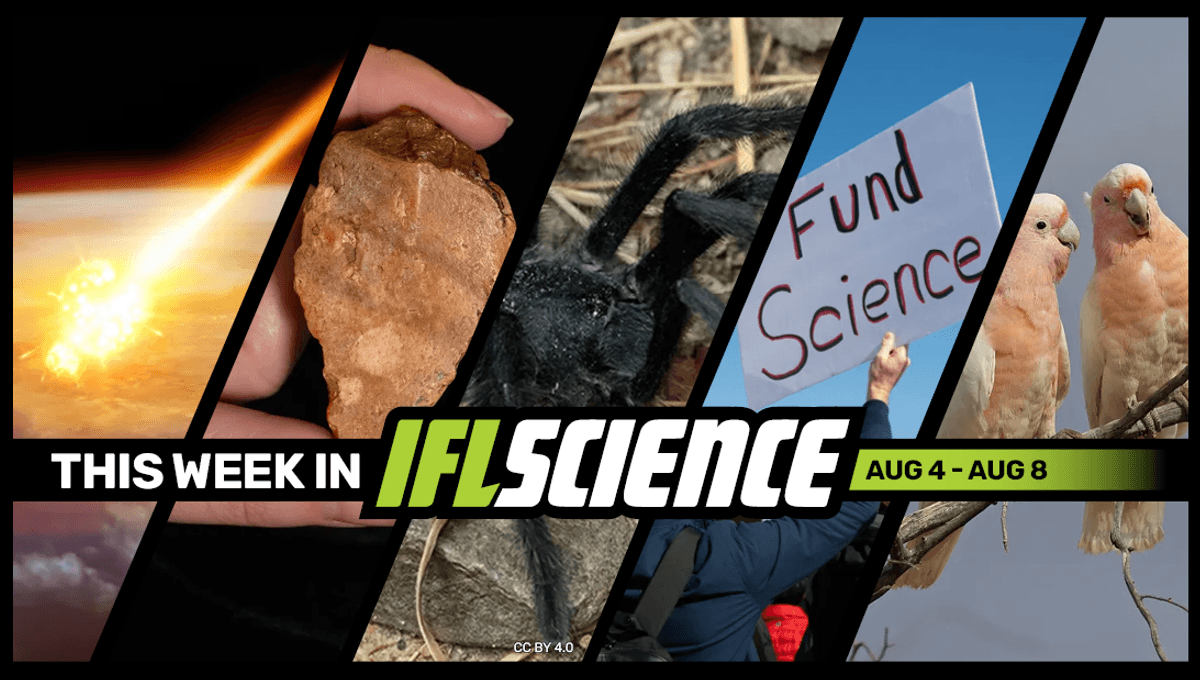Are You More Likely To Be Killed By An Elephant Or An Asteroid? RFK Jr Pulls Millions Of Dollars Of mRNA Vaccine Funding, And Much More This Week

Are You More Likely To Be Killed By An Elephant Or An Asteroid? RFK Jr Pulls Millions Of Dollars Of mRNA Vaccine Funding, And Much More This Week
This week, the miniature “hobbit” ancient humans of Flores Island may have come from the nearby island of Sulawesi, where researchers have discovered stone tools, four newly discovered tarantulas have been discovered with the longest known schlongs in the spider world, and cockatoos have at least 30 different dance moves that they love to perform. Finally, we explore how scientists are using science fiction to help explore possible futures.
Humans are not the most rational beings when it comes to fear, especially about things that are interesting and dramatic in the media, but are rare occurrences in real life. If you are a millennial, you’ll know by now that quicksand, while dangerous, is not quite the threat we were promised as kids. Asteroids, however, are an interesting threat. We know they are serious, but how worried should we be? Read the full story here The miniature “Hobbit” humans of Flores Island may have come from the nearby island of Sulawesi, where researchers have discovered evidence for ancient hominin occupation up to 1.5 million years ago. It’s currently unclear exactly which ancestral species was present on the Indonesian island at this early point in our history, but the journey from mainland southeast Asia to Sulawesi may have seen humans cross the ocean for the very first time. Read the full story here Four new tarantula species have been discovered in the Arabian Peninsula and the Horn of Africa. While that is remarkable in itself, what makes these four new tarantulas stand out from other known species is their surprisingly long, er, "ninth legs". Read the full story here The US Department of Health and Human Services (HHS), under the leadership of Robert F. Kennedy Jr., just announced a “coordinated wind-down” of mRNA vaccine development. That includes the termination of 22 research contracts worth hundreds of millions of dollars, and a moratorium on new agreements being initiated. His reasoning why, however, goes against all scientific consensus and countless evidence. Read the full story here Cockatoos have at least 30 dance moves they love to show off, and while not every species has been spotted making every move, some individuals combine moves in ways others don’t to create further metamoves. The purpose of the dancing is unknown, because while it may have evolved from courtship, it now occurs far more widely. Read the full story here Storytelling and creative imagining are powerful tools, even for science. Now, some researchers are using them to explore possible futures. The techniques involved in creating a fictional setting can help us explore future scenarios or complex questions, such as what role AI technologies will play, how future climate change may impact us, or even how people may respond to off-world settling. We spoke to three researchers who have embraced storytelling to explore the uncertainties and possibilities we may face in our individual and collective futures. Read the full story here Have you seen our e-magazine, CURIOUS? Issue 37 (August 2025) is available now. This month, we asked, “Are There Body Parts You Can Live Without?” – check it out for exclusive interviews, book excerpts, long reads, and more. PLUS, the We Have Questions podcast – an audio version of our coveted CURIOUS e-magazine column – continues. In episode 11, we ask, “Why Are Yawns Contagious?” The Big Questions podcast has returned, and we’re continuing season 5 with episode 4’s big question: How Has The Internet Changed The Way We Use Language?Create an IFLScience account to get all the biggest science news delivered straight to your inbox every Wednesday and Saturday.
Are You More Likely To Be Killed By An Elephant Or An Asteroid? Science Now Has The Answer
We May Finally Know Where The "Hobbit" Humans Came From
Four New Species Of Tarantulas Discovered With Longest Known Schlongs In The Spider World
RFK Jr Pulls Millions Of Dollars Of mRNA Vaccine Funding, Citing Misinformation – Here's What To Know
Cockatoos Love To Dance, Showing Off 30 Different Moves That Some Combine In Unique Ways
TWIS is published weekly on our Linkedin page, join us there for even more content.
Feature of the week:
Forecasting Tomorrow: How Science Fiction Is Helping Scientists Explore Possible Futures
More content:


